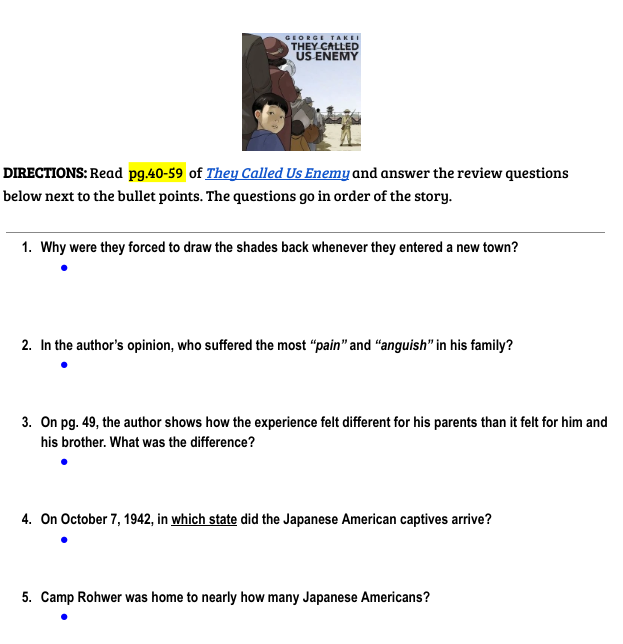Read pages 40-59 of They Called Us Enemy and answer the following questions: 1. Why were they forced to draw the shades back whenever they entered a new town? 2. In the author's op... Read pages 40-59 of They Called Us Enemy and answer the following questions: 1. Why were they forced to draw the shades back whenever they entered a new town? 2. In the author's opinion, who suffered the most 'pain' and 'anguish' in his family? 3. On pg. 49, how did the author show that the experience felt different for his parents than it felt for him and his brother? 4. On October 7, 1942, in which state did the Japanese American captives arrive? 5. Camp Rohwer was home to nearly how many Japanese Americans?

Understand the Problem
The question is asking for responses to review questions related to specific pages of the book 'They Called Us Enemy' by George Takei. The questions require an understanding of the text and its themes.
Answer
1. To keep captives from seeing their destination. 2. His mother. 3. Parents: painful; children: adventurous. 4. Arkansas. 5. Nearly 8,500.
- They were forced to draw the shades back to keep the captives from seeing where they were being taken. 2. In the author's opinion, his mother suffered the most 'pain' and 'anguish.' 3. The author showed that for his parents, the experience was painful and filled with uncertainty, while for him and his brother, it felt like an adventure. 4. On October 7, 1942, the captives arrived in Arkansas. 5. Camp Rohwer was home to nearly 8,500 Japanese Americans.
Answer for screen readers
- They were forced to draw the shades back to keep the captives from seeing where they were being taken. 2. In the author's opinion, his mother suffered the most 'pain' and 'anguish.' 3. The author showed that for his parents, the experience was painful and filled with uncertainty, while for him and his brother, it felt like an adventure. 4. On October 7, 1942, the captives arrived in Arkansas. 5. Camp Rohwer was home to nearly 8,500 Japanese Americans.
More Information
The experiences illustrated in 'They Called Us Enemy' reflect on the broader impact of internment on families, highlighting emotional and perceptual differences.
Sources
- They Called Us Enemy - Pages 40 - 80 Summary & Analysis - bookrags.com
AI-generated content may contain errors. Please verify critical information